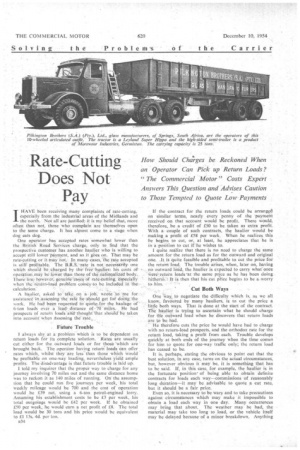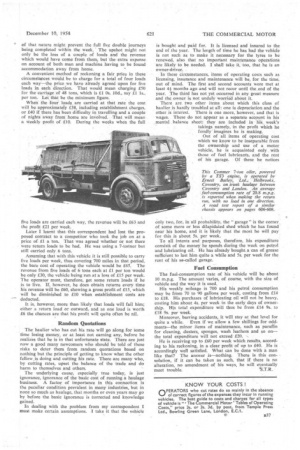Rate-Cutting Does Not
Page 68

Page 71

If you've noticed an error in this article please click here to report it so we can fix it.
Peay
HAVE been receiving many complaints of rate-cutting, / Especially freim the industrial areas of the Midlands and
the north. Not all are justified: it is my belief that, more °fie(' than not, those who complain are themselves open to the same charge. It has alp-lost come to a stage when dog eats dog.
One operator has accepted rates somewhat lower than the British Road Services charge, only to find that the prospective Customer has another haulier who is willing to accept still lower payment, and so it goes on. That may be rate-cutting or it May not. In many. cases, 'the rate accepted is still.profitable, The B.R.S..rate is not necessarily one• which should be/charged by the free-haulier his costs Of operation ma Y be lower than thoseof the nationalized body, There arcL,however, genuiite' eases Of rate-cutting. evecially when the ,•rettirriload problem comes to be included in the calculation': A haulier, asked to 'take. on ajoK. wrote to :Me for assistance in,asSessing -the: rate he-should get fof'dotng.the work. He had been requested toqn_rrte_fOr the haulage of 6-ton loads over a 'lead,. distance of---70 'rniies. He had prospects of return loads 'and'thOught That should be taken into account', when assessing the rate, Fatute. Trouble .
1 always shy,. at a problem -which is to be dependent on return loads for its .complete solution. Rates are usually cut either for the outward loads or for those -which are brought back. The operator having return' loads Can offer , rates which, whilst they are less-than those which Would be profitable on one-way loading, neverthelesk Yield ample profits. The disadvantage is that future trbuble is laid up.
I told my inquirer that the proper way to charge for any journey involving 70 miles out and -the same distance home was to reckon it as 140 miles of running. On the assumption that he could run five journeys per week, his total weekly mileage would be 700 and the cost of operation• would be £39 net, using a 6-ton petrol-engined lorry. Assuming his establishment costs to be £3 per week, his total outgoings would be £42 per week. If he obtained £50 per week, he would earn a net profit of £8. The total load would be 30 tons and his price would be equivalent to £1 13s. 4d. per ton.
1334
If the contract for the return loads could be arranged on -similar terms, nearly every penny of the payment received on that account would be profit. There would, therefore,. be .a credit of £50 to be taken as extra profit. With a couple of such contracts, the haulier would be making a profit of £58 per week. When he realizes this he begins to cut, or, at least, he appreciates that he is in a position to cut if he wishes to.
I quite realize that there is no need to charge the same amount for the return load as for the outward and original one. ,It is quite feasible and profitable to Cut the price for the return load. The trouble arises, when, later on, having
• no outward load, the haulier is expected to carry what once Werc..return loads-at the same price as he has been doing hithert.O.-7 It is then That his cut price begins to be a-worry
to him. • ".
Cut Both Ways
One way, to negotiate the difficulty which is, as we all
• . know, favoured by many hauliers, is to cut the price a little both ways. That is done at the start of the contract. The haulier is trying to ascertain what he should charge for tlfe mitward load when he discovers that return loads are to be had.
He therefore cuts the price he would have had to charge with no return-load prospects, and the orthodox rate for the return load, taking a profit from each. Trouble develops quickly at both ends of the journey when the time comes for him to quote for one-way traffic only; the return load has ceased to be.
It is, perhaps, stating the obvious to point out that the best solution, in any case, turns on the actual circumstances, but, however obvious it may be, it is something that has to be said. If, in this case, for example, the haulier is in the fortunate position' of being able to obtain definite contracts for loads each way—commissions of reasonably long duration—it may be advisable to quote a cut rate, but it should be a fair price.
Even so, it is necessary to be wary and to take precautions against circumstances which may make it impossible to obtain a load each way in one day. Many occurrences may bring that about. The weather may be bad, the material may take too long to load, or the vehicle itself may be delayed because-of a minor breakdown. Anything of that nature might prevent the full five double journeys being completed within the week.' The upshot might not only be the loss of a couple of loads and the revenue which would have come from them, but the extra expense on account of both man and machine having to be found accommodation away from home.
A convenient method of reckoning a fair price in these circumstances would be to charge for a total of four loads each way—the price we have already agreed upon for five loads in each direction. That would mean charging £50 for the carriage of 48 tons, which is £1 Os. 10d., say £1 Is„ per ton. Let that be the minimum figure.
When the four loads are carried at that rate the cost will be approximately £38, including establishment charges, or £40 if there has been difficulty in travelling and a couple of nights away from home are involved. That will mean a weekly profit of £10. During the weeks when the full five loads are carried each way, the revenue will be £63 and the profit £21 per week.
Later I learnt that, this correspondent had lost the proposed contract to a competitor who took the job on at a price of £1 a ton. That was agreed whether or not there were-return loads to be had. He was using a 7-twiner but still carried only 6 tons.
Assuming that with this vehicle it is still possible to carry five loads per week, thus covering 700 miles in that period, the bare cost of operating the vehicle would be £45. The revenue from five loads of 6 tons each at £1 per ton would be only £30, the vehicle being run at a loss of £15 per week. The operator must, therefore, get some return loads if he is to live. If, however, he does obtain returns every time his revenue will be £60, showing a gross profit of 115, which will be diminished to £10 when establishment costs are deducted.
It is, however, more than likely that loads will fail him; either a return load or outward, and as one load is worth £6 the chances are that his profit will quite often be nil.
Random Quotations
The haulier who has cut his rate will go along for Some time losing money, or at least not earning any, before he realizes that he is in that unfortunate state. There are just now a good many newcomers who should be told of these risks to deter them from random quotations based on nothing but the principle of getting to know what the other fellow,is doing and cutting his rate. There are many who, by cutting rates, upset the balance of the trade and do harm to themselves and others.
The underlying cause, especially true today, is just ignorance, ignorance of the basic cost of running a haulage business. A factor of importance in this connection is the peculiar condition prevalent in many industries, but in none so much as haulage, that months or even years may go by before the basic ignorance is corrected and knowledge gained.
In dealing with the problem from my correspondent I must make certain assumptions. I take it that the vehicle is bought and paid for. It is licensed and insured to the end of the year. The length of time he has had the vehicle is not such as to make it necessary for the tyres to be renewed, also that no important maintenance operations are likely to be needed. I shall take it, hi°, that he is an owner-driver.
In these circumstances, items of operating costs such as licensing, insurance and maintenance will be, for the time, out of mind. The first and second accounts were met at least 4+ months ago and will not recur until the.end of the year. The third has not yet occurred in any great measure and the owner is not unduly worried about it.
There are two other items about which this class of haulier is hardly troubled at all: one is depreciation and the other is interest. There is one more, however, and that is wages. These do not appear as a separate account in his mental balance sheet: they are included in his week's takings namely, in the profit which he fondly' imagines he is making.
Out of all items of operating cost which we know to be inseparable from the ownership and use of a motor vehicle, he is acquainted only, with those of fuel lubricants, and the rent of his garage. Of these he notices only two, for, in all probability, the "garage" is the corner, of some more or less dilapidated shed which he has found near his home, and it is likely that the most he will pay for this is about 5s. per week.
To all intents and purposes, therefore, his expenditure consist i of the money he spends during the week on petrol and lubricating oil. He has already bought a can of grease sufficient to last him quite a while and 5s. per week for the rent of his se-called garage.
Fuel Consumption
The fuel-consumption rate of his vehicle will be about 10 m.p.g. The amount varies, of course, with the size of vehicle and the way it is used.
His weekly mileage is 700 and his petrol consumption may be from 70 to 90 gallons per week, costing from £14 to £18. His purchases of lubricating oil will not be heavy, costing him about 4s. per week in the early days of ownership. His total expenditure will thus be from £14 9s. to £18 9s. per week.
Moreover, barring accidents, it will stay at that level for quite a while. Even if we allow a few shillings for oddments—the minor items of maintenance, such as paraffin for cleaning, dusters, sponges, wash leathers and so on— the total expenditure will not exceed £20. • He is receiving up to £60 per week which results, according to his reckoning, in a clear profit of up to £40. He is accordingly well satisfied. What can be done with a man like that? The answer is—nothing. There is this con• solation, if it can be taken as such, that if there is no alteration, no amendment of his ways, he will eventually meet trouble.




















































































































